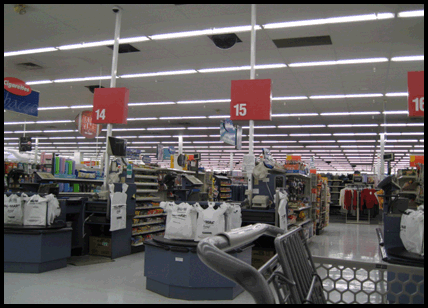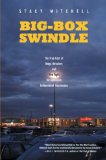Josh Stephens feels driven to bring attention to last year's Big Box Swindle: The True Cost of Mega-Retailers and the Fight for America's Independent Businesses by Stacey Mitchell. The book argues that mega-retailers have not only drained the American economy of much of its entrepreneurial spirit, but also have contributed to the degradation of the social fabric, intellectual life, and built environment of cities and towns across the United States.
 I originally read Big Box Swindle out of curiosity and latent disgust. I review it out of moral obligation.
I originally read Big Box Swindle out of curiosity and latent disgust. I review it out of moral obligation.
Author Stacy Mitchell takes aim at Walmart (neè Wal-Mart) and its fellow mega-retailers, whose transgressions – from dubious labor practices to borderline price-fixing to aesthetic atrocities – she describes in harrowing detail. Those stories have been told before, but rarely in such a measured, comprehensive fashion. The chair of the American Independent Business Alliance, Mitchell is a practical crusader. Her lament is not as politically charged as those of Naomi Klein or as sappy as those of Barbara Ehrenreich but is every bit as affecting. These virtues, plus the widespread backlash against big box, might have been enough to vault Mitchell on to the best seller lists, were it not for a twist that has nearly ensured her own obscurity.
The benevolence of bookstores may seem obvious compared to that of omnivorous retailers, but in the course of picking apart the chain-store economy, Mitchell argues that Borders and Barnes & Noble are themselves no strangers to cutthroat capitalism. They may hide behind caricatured faces of literary greatness, but like any common purveyor of pop culture, their inventory relies not so much on intellectual depth and creative fervor as on profit. Mitchell accuses the big book boxes of ignoring small publishers, avoiding risks on new authors, hiring semiliterate employees, and giving favorable placement in their stores to sure things.
So Big Box Swindle itself is not likely to appear on one of those special tables at Borders, because any chain that puts it within easy reach would sow the seeds of its own destruction. (An appropriate, if nonsensical, analog would be for McDonald's to put Fast Food Nation on the Super Value Menu.) Big Box Swindle's relatively poor sales to date prove its own thesis: challenging, subversive discourse cannot thrive in a hypercapitalist world. Of thirty-two Borders stores in the Bay Area -- hardly infertile ground for anti-establishment critiques -- a grand total of four had paperback copies in stock recently. They probably had to make room for Gossip Girl.
This is a tragedy that transcends aesthetics. Bookstores are not just purveyors of knowledge; they are regulators. Ideally, they should distribute the best ideas -- such as, for instance, those that rail against purposeful blight.
Though not all of big boxes' offenses involve land use – some include trifles like human rights or antitrust violations – Mitchell analyzes the toll that chains and big boxes have taken on almost every corner of America. Big Box Swindle aggregates all the familiar anecdotes into one nationwide narrative in which these megamarts have caused the evacuation of downtowns, created nonplaces along highways and backroads from small towns to suburbs, and degraded even the most remote corners of the American landscape.
Mitchell does not take direct aim at planners, but her argument begs us to wonder what was going through the minds of the planners who signed off on all of these stores – if planners aren't supposed to prevent this sort of thing, what good are they?
Granted, some jurisdictions' land-use controls are strong enough to hold big boxes at bay, and some well intentioned rubes may have fallen prey to Walmart's folksy ruthlessness. Walmart dazzles them with promises of jobs and sales tax revenue, but it does so with scant mention of the jobs and revenues of existing businesses whose demise is all but assured when Walmart sets up shop. Towns are duped into thinking that they represent limitless consumer markets and have residents content with minimum-wage jobs.

Mitchell even reports that big boxes' prices, far from being "always low," vary little from those of smaller competitors and often apply to goods of lower quality (Mitchell cites one critic who says that Walmart sells not bikes but rather "bicycle-shaped objects"). Compare prices at any of San Francisco's independent coffee houses with those of Starbucks (not a big box, but a chain nonetheless): hippies and yuppies pay the same as soccer moms.
Mitchell also contends that while America hangs on every tick of the Wall Street tape, local multipliers generate truer wealth than does the gamesmanship and speculation of the stock market. They subvert what Mitchell describes as the intimate, direct connections that ought to fuel local economies and, by extension, ought to concern local planners.
The ante-Walton economy worked something like this: The local hardware store gets a loan from the local bank and rents a downtown storefront. It then retains the local advertising firm. The advertising firm gives the artistic high school student her first job. The student deposits her wages into the bank, and she buys supplies from the hardware store. And the cycle continues. Nowhere does Adam Smith say that a single cent has to go to Bentonville or that the marketplace of ideas must be limited to that which will enrich Borders.
Mitchell could have played it safe and limited her grievance to retailers that do not hold her fate in their hands. Instead, she fell on her sword, and her intellectual honesty deserves acclaim. In promoting Big Box Swindle I am not implying that one impassioned review will correct the injustices of the supposed free market. But it's a big world that needs saving. Mitchell has done her part. I only wish to do mine.
Josh Stephens is a former editor of The Planning Report and the Metro Investment Report, monthly publications covering, respectively, land use and infrastructure in Southern California.

Planetizen Federal Action Tracker
A weekly monitor of how Trump’s orders and actions are impacting planners and planning in America.

Chicago’s Ghost Rails
Just beneath the surface of the modern city lie the remnants of its expansive early 20th-century streetcar system.

Amtrak Cutting Jobs, Funding to High-Speed Rail
The agency plans to cut 10 percent of its workforce and has confirmed it will not fund new high-speed rail projects.

Ohio Forces Data Centers to Prepay for Power
Utilities are calling on states to hold data center operators responsible for new energy demands to prevent leaving consumers on the hook for their bills.

MARTA CEO Steps Down Amid Citizenship Concerns
MARTA’s board announced Thursday that its chief, who is from Canada, is resigning due to questions about his immigration status.

Silicon Valley ‘Bike Superhighway’ Awarded $14M State Grant
A Caltrans grant brings the 10-mile Central Bikeway project connecting Santa Clara and East San Jose closer to fruition.
Urban Design for Planners 1: Software Tools
This six-course series explores essential urban design concepts using open source software and equips planners with the tools they need to participate fully in the urban design process.
Planning for Universal Design
Learn the tools for implementing Universal Design in planning regulations.
Caltrans
City of Fort Worth
Mpact (founded as Rail~Volution)
City of Camden Redevelopment Agency
City of Astoria
City of Portland
City of Laramie



























